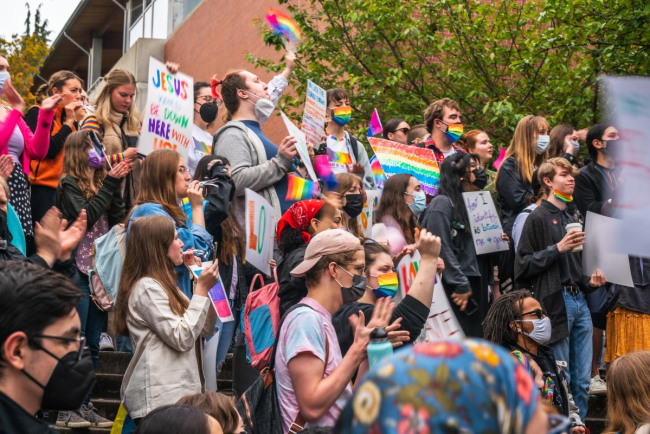You have /5 articles left.
Sign up for a free account or log in.

Student protests have been constant since the SPU Board of Trustees affirmed a discriminatory hiring policy in May.
Rio Giancarlo
More than two weeks ago, Seattle Pacific University announced a decision by its Board of Trustees to uphold hiring policies that discriminate against LGBTQ+ individuals. Students soon occupied the administration building in protest. Two weeks later, they’re still there.
Protesters plan to continue their sit-in over the summer, relying on local students as well as alumni to keep the pressure on the university to change the hiring policy. And they note the support of faculty and staff members—including some administrators.
The Faculty Senate has issued a resolution urging the Board of Trustees drop its discriminatory hiring policy. That resolution passed with more than 80 percent of eligible faculty members voting in favor.
But trustees remain the group most resistant to change—and the only ones who can reverse a policy that led to a 2021 no-confidence vote in the board and the recent weeks of protests.
Seattle Pacific University, which is affiliated with the Free Methodist Church, holds that “sexual experience is intended between a man and a woman,” according to its Statement on Human Sexuality. That means that “employees are expected to refrain from sexual behavior that is inconsistent with the University’s understanding of Biblical standards, including cohabitation, extramarital sexual activity, and same-sex sexual activity,” according to university policy.
But students, faculty and alumni say the university has progressed over the years; it now welcomes LGBTQ+ students, and they say it’s time for the Board of Trustees to evolve with them. One complication, however, is that changing SPU's policy on LGBTQ+ hiring would ultimately end its membership with the Free Methodist Church.
Policies and Protests
Under fire from all sides, SPU trustees aren’t saying much about the decision to maintain the controversial hiring policy.
Three trustees, including the recent chair, have left the board since the vote in late May. Two resigned while another reportedly left upon completion of his term.
“We want the community of SPU to know that this was a thorough and prayerful deliberation,” former board chair Cedric Davis said in a statement on the SPU website. “While this decision brings complex and heart-felt reactions, the Board made a decision that it believed was most in line with the university’s mission and Statement of Faith and chose to have SPU remain in communion with its founding denomination, the Free Methodist Church USA, as a core part of its historical identity as a Christian university.”
Davis was among the trustees who left the board following the recent decision; he did not respond to a request for comment. The board has been unwilling to explain how individual trustees voted, and SPU declined to make any members available for comment.
Kevin Johnson, the member whose term ended last month, reflected on the decision in a LinkedIn post, noting that he disagreed with how the majority of SPU trustees voted on the hiring issue.
“While I respect each Board Member on an individual level, I do not agree with the Board’s decision to uphold the University’s policies surrounding hiring, especially in regards to members of the LBGTQIA+ community,” Johnson wrote. “I wholeheartedly stand for equality in all forms, and will always push for a community of love and inclusion. I send this message to anyone who has ever been a minority, or felt excluded from a larger group on any level. Especially to the Students, Faculty, and Staff of SPU, I stand with you. I am sending my love to you.”
This marks the second time in as many years that SPU’s Board of Trustees has affirmed a hiring policy that discriminates against LGBTQ+ prospective employees. The first instance came in April 2021, following a lawsuit by Jeaux Rinedahl, a gay adjunct nursing professor who sued SPU claiming he was denied a full-time position due to his sexual orientation. That lawsuit was settled out of court last month, according to the university website.
SPU Faculty Senate chair April Middeljans suggested that Rinedahl’s lawsuit drew attention to the policy, which has been “obscure and confusing” over the years, she said.
“Three other reasons that explain why questions about LGBTQIA+ hiring has not arisen more strongly up until now is that 1) the conduct policy and the Statement on Human Sexuality have not been consistently and prominently featured as a part of the hiring process over the years, at least for faculty, 2) adjuncts have apparently not been required to hold to this conduct standard (for reasons I don’t understand) and 3) the strong racial/ethnic DEI efforts at SPU over the years have led many to assume a similar type and level of commitment on LGBTQIA+ issues,” Middeljans wrote in an email.
Rinedahl’s lawsuit sparked controversy on campus and forced the trustees to reconsider their position, which ultimately led to the formation of a 14-member work group in January to make policy recommendations. Those recommendations were delivered in April, setting up the board’s latest vote.
Kevin Neuhouser, a sociology professor at SPU, was co-chair of the newly formed LGBTQIA+ Work Group, which he said was made up of faculty, staff, trustees and administrators with diverse opinions. After considering what might happen if the university changed its hiring practices and how the decision would play out financially, the group recommended that the board drop the policy.
“What we argued for was a change in the hiring policy without the university coming out with a statement of affirmation. We weren’t trying to tell conservatives, ‘The university is going to say that you’re wrong.’ All we were asking from the conservative side was that they make space at the table for voices that disagreed with them,” Neuhouser said. “That’s what we recommended.”
But, as in April 2021, trustees voted to keep the discriminatory hiring policy, rejecting the work group’s recommendations and setting off a reaction on the SPU campus.
Since the vote in May, students have occupied the administration building. Last week the Faculty Senate passed a resolution endorsing the recommendations of the LGBTQIA+ Work Group and calling on trustees to change the hiring policy in question. The resolution also notes that a survey of faculty and staff conducted last year overwhelmingly supported changing the hiring policy.
Faculty members also claim trustees acted inappropriately in their decision, breaking a confidentiality agreement by leaking the recommendations of the LGBTQIA+ Work Group to the Free Methodist Church. Prior to the leak, Neuhouser said that SPU would have been able to change its policy and remain in good standing with the denomination. However, once tipped off, the Free Methodist Church changed its policies, adding a new rule to bar member institutions from hiring individuals who run afoul of teachings on sexual purity. The update, Neuhouser said, means that changing the hiring policy at SPU would now violate church rules.
SPU did not respond to questions about the alleged leak of documents to the church.
Middeljans noted “the excessive influence the Free Methodist Church has had on the Board’s decisions in both April 2021 and May 2022” in maintaining the discriminatory hiring policy.
According to its bylaws, one-third of the SPU Board of Trustees must be comprised of Free Methodist Church members. And on the present board, two members—those suspected of leaking LGBTQIA+ Work Group documents to the church—also serve on the Free Methodist Church Board of Administrations, which then changed its policy to bar member institutions from hiring LGBTQ+ individuals.
“What has been most distressing to the SPU community is, in fact, the way these two trustees used the power of the church to influence (or, I would argue, violate) the shared governance process we have been engaging all year as we attempt to resolve the current crisis,” Middeljans said.
Beyond the statement and an FAQ page explaining the decision, the board also answered presubmitted questions in a town hall–style meeting with the university community. But students and faculty said that the answers were vague and offered no real insights.
“The board did attempt to provide explanations for their decisions at a town hall with the SPU community on May 26, but their answers were not very concrete or satisfying,” Middeljans said. “I don’t think this is obfuscation on their part; rather, those on the board who voted to keep the policy are just simply not able to articulate 1) how this policy is in the best interest of SPU and 2) how this policy is commensurate with a loving, welcoming Christian environment.”
Chloe Guillot, a graduating senior and protest organizer, said the board has offered little in the way of explanation, other than saying that changing the policy would cost SPU its affiliation with the Free Methodist Church.
But that’s a sacrifice she and other students would happily make.
“I’m a Christian, and I don’t believe that Christianity has any basis for discrimination, especially on the basis of sexuality,” Guillot said. “Also for me, I don’t want to see people weaponizing my faith and my religion to hurt people, and I think a lot of people at SPU share that sentiment.”
Disaffiliating with the Free Methodist Church would result in only minor financial changes for SPU. According to university figures, the Free Methodist Church denomination has provided SPU a total of $324,000 in financial support over the past four decades.
Resistance to Change
With the board having twice affirmed the anti-LGBTQ hiring policy at SPU, students are pushing back, not only through a sit-in but also through possible legal action. A GoFundMe page to finance a lawsuit against the Board of Trustees has already raised more than $23,000.
Students plan to sue trustees for breach of fiduciary duty, according to the GoFundMe page. They are asking for a policy change by July 1. If the Board of Trustees reverses course, they’ll donate the funds to SPU. They’re also asking alumni to cease donations to the university.
Whether students will prevail in court is questionable, suggests David Nguyen, a lawyer and professor in the School of Education at Indiana University–Purdue University Indianapolis.
“I think, unfortunately, a court of law will probably say that students are not the injured party in this case,” Nguyen said. “If anything, faculty members or staff that have been discriminated against by this policy probably have more standing for a lawsuit than students potentially have.”
The discriminatory hiring policy itself exists in a legal gray area, Nguyen added.
“The Constitution regulates our public institutions; the Constitution has no reach to our private institutions. And so, to a certain extent, our private institutions do not have to uphold certain rights that our public institutions have to uphold, unless they decide to contractually provide those rights, like through a faculty handbook or a student and/or an employment contract,” he said.
Though governmental and legal remedies may be a stretch, students still have the power of protest and plan to continue sleeping outside administrative offices, fueled by free doughnuts and other food provided by supportive faculty and staff members.
“One of the cool things about our community is that we are so united on these efforts,” said Laur Lugos, a graduating senior. “We’re planning on moving the sit-in into the summer, and the alumni are the ones who are willing to take it over and organize it and continue with it through the summer, even though students have to go home, or graduate and get a job and stuff like that.”
But the hiring policy remains firmly in the hands of trustees who have twice upheld it.
“Right now it feels like we’re locked into a situation where the campus community—the faculty, staff and students are committed to one vision of what SPU should be, and the board is committed to a different vision,” Neuhouser said. “Given the board’s legal powers and rights to make those kinds of policy decisions, it’s not clear what would move them given that it seems like they’re not—at least currently—being responsive to this massive expression of disagreement.”
This story has been updated to correct the spelling of the Faculty Senate chair's name: April Middeljans.




